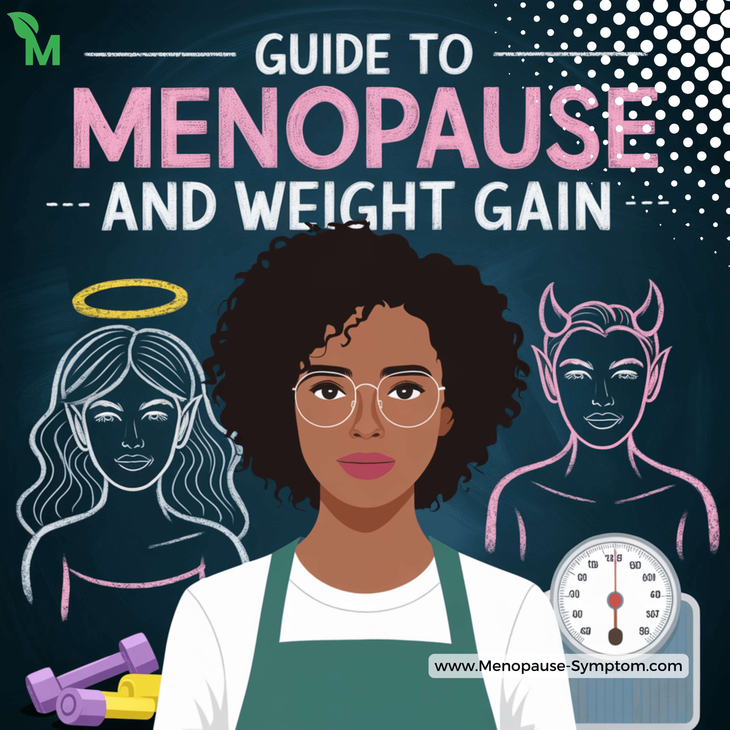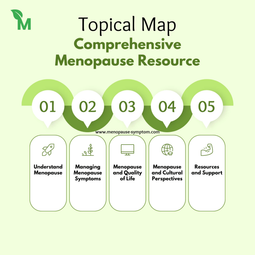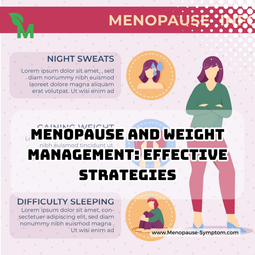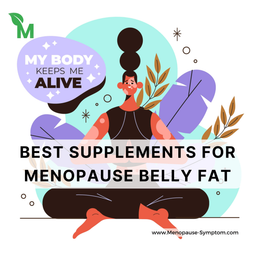Guide To Menopause And Weight Gain
On
24/10/2024Reading time:
1 min
Summary:
Struggling with menopause-related weight gain? Explore our comprehensive guide to supplements for menopause belly fat. We'll cover the most effective natural remedies, hormone-balancing options, and lifestyle changes to help you regain control of your body during this transition.
Discover effective supplements for menopause belly fat. Learn about natural remedies, hormone-balancing options, and lifestyle changes to combat weight gain during menopause.

Menopause and Weight Gain: Understanding the Connection and Taking Control
Are you experiencing unexplained weight gain as you approach or go through menopause? You're not alone. Many women find themselves battling the scale during this transitional phase of life. In this comprehensive guide, we'll explore the intricate relationship between menopause and weight gain, and provide actionable strategies to help you maintain a healthy weight.
The Menopause-Weight Gain Connection: What You Need to Know
Hormonal Havoc: The Estrogen Effect
As women enter menopause, estrogen levels begin to decline. This hormonal shift can have a significant impact on metabolism and fat distribution. Here's how:
Slowed Metabolism: Lower estrogen levels can lead to a decrease in metabolic rate, making it easier to gain weight and harder to lose it.
Muscle Mass Reduction: Estrogen plays a role in maintaining muscle mass. As levels drop, you may experience muscle loss, further slowing your metabolism.
Fat Distribution Changes: Menopausal women often notice increased abdominal fat, as opposed to fat storage in the hips and thighs.
Lifestyle Factors Contributing to Menopausal Weight Gain
Reduced Physical Activity: Joint pain and fatigue associated with menopause can lead to a more sedentary lifestyle.
Stress and Emotional Eating: Hormonal fluctuations may increase stress levels, potentially leading to comfort eating.
Sleep Disturbances: Night sweats and insomnia can disrupt sleep patterns, affecting hormones that regulate appetite and metabolism.
The Health Risks of Menopausal Weight Gain
Gaining weight during menopause isn't just about aesthetics. Excess weight, particularly around the midsection, can increase your risk of:
Heart disease
Type 2 diabetes
Certain cancers (breast, colon, and endometrial)
Breathing problems
Reduced stamina and energy levels
Strategies to Combat Menopausal Weight Gain
Optimize Your Diet
Focus on nutrient-dense, whole foods
Increase protein intake to support muscle mass
Include fiber-rich foods to promote satiety
Limit processed foods, sugars, and unhealthy fats
Stay Active
Incorporate regular aerobic exercise (30 minutes, 5 days a week)
Add strength training to maintain muscle mass (2-3 times per week)
Try low-impact activities like swimming or yoga to reduce joint stress
Manage Stress
Practice mindfulness or meditation
Engage in stress-reducing activities like deep breathing or gentle stretching
Consider talking to a therapist or joining a support group
Prioritize Sleep
Establish a consistent sleep schedule
Create a cool, dark sleeping environment
Avoid screens before bedtime
Stay Hydrated
Drink plenty of water throughout the day
Limit caffeine and alcohol intake
Consider Hormone Therapy
Discuss the potential benefits and risks of hormone replacement therapy with your healthcare provider
Supplement Wisely
Consult with your doctor about supplements that may support metabolism and overall health during menopause
Embracing a Healthy Menopause Journey
As women enter menopause, hormonal shifts can lead to increased fat storage, particularly around the midsection. This weight gain isn't just a cosmetic concern; it can also impact overall health and increase the risk of various diseases.
Exercise: Your Ally Against Menopausal Weight Gain
Strength Training for Muscle Mass
Contrary to popular belief, weight lifting won't make women bulky. Instead, it helps maintain muscle mass, which is crucial for metabolism and bone health during menopause.
Rock Climbing
This full-body workout challenges both physical strength and mental agility, making it an excellent choice for menopausal women seeking a comprehensive fitness routine.
Swimming
Low-impact yet highly effective, swimming provides a full-body workout that's gentle on joints while promoting cardiovascular health and weight management.
Yoga
Beyond its physical benefits, yoga offers stress relief and mindfulness, addressing both the physical and emotional aspects of menopause.
Nutrition: Fueling Your Body Right
Caloric Intake Adjustments
As we age, our caloric needs decrease. Women over 50 typically require about 1600 calories daily for a sedentary lifestyle, 400 fewer than in their 20s.
Power of Plants
Cruciferous vegetables and leafy greens are essential for managing menopausal symptoms and supporting weight loss. Include kale, spinach, broccoli, and cabbage in your diet.
Phytoestrogen-Rich Foods
Foods like flaxseeds, soy, chickpeas, and apples contain phytoestrogens, which may help alleviate menopausal symptoms and support weight management.
Dairy Considerations
While dairy isn't directly linked to menopausal weight gain, moderation is key. Focus on calcium and vitamin D-rich foods for bone health.
Protein for Muscle Maintenance
Aim for 10-35% of daily calories from protein sources like lean meats, fish, legumes, and plant-based proteins to combat muscle loss.
Whole Grains for Heart Health
Incorporate whole grains like quinoa, buckwheat, and oats to manage blood sugar levels and support heart health during menopause.
Lifestyle Changes for Long-Term Success
Stress Management
Practice stress-reduction techniques like meditation or deep breathing to manage cortisol levels, which can contribute to weight gain.
Quality Sleep
Prioritize good sleep hygiene to regulate hormones and metabolism, crucial factors in weight management during menopause.
Regular Health Check-ups
Monitor your health regularly with your healthcare provider to address any underlying issues that may contribute to weight gain.
Stay Hydrated
Proper hydration supports metabolism and can help distinguish between hunger and thirst.
Build a Support System
Connect with other women experiencing menopause for emotional support and shared strategies.
Essential Supplements for a Smoother Transition
Navigating the menopausal journey can be challenging, especially when it comes to managing weight gain. As hormonal changes take center stage, many women find themselves struggling with unwanted pounds. Fortunately, certain supplements, vitamins, and minerals can help ease this transition and support weight management during menopause.
The Menopause-Weight Gain Connection
During menopause, hormonal fluctuations can lead to increased fat storage, particularly around the midsection. This weight gain is often accompanied by other symptoms like hot flashes, night sweats, and mood swings. While a balanced diet and regular exercise are crucial, specific supplements can provide additional support.
Key Supplements for Menopausal Weight Management
Calcium: Building Strong Bones and Battling the Bulge
Calcium isn't just for bone health; it may also play a role in weight management. Aim for 1,200 milligrams daily to ward off osteoporosis and potentially aid in weight control.
Turmeric: Nature's Anti-Inflammatory Powerhouse
Curcumin, the active compound in turmeric, acts as a phytoestrogen, mimicking estrogen's effects in the body. This can help alleviate menopause symptoms and potentially assist with weight management.
Moringa: The Metabolism Booster
This nutrient-dense plant can improve metabolism, aiding in weight management during menopause. It's also rich in vitamins B, C, A, and minerals like potassium and manganese.
Probiotics: Gut Health for Weight Control
Probiotics support digestive health and may help prevent menopausal weight gain. Certain strains, like L. Gasseri, B. Breve, and B. Lactis, have been shown to promote fat loss and balance blood sugar levels.
Collagen: Maintaining Skin Elasticity and More
Collagen supplementation can help combat the natural decline in this protein during menopause, potentially aiding in weight management and skin health.
Curry Leaf: A Multifaceted Menopause Ally
Rich in vitamins and minerals, curry leaf can help regulate blood sugar and cholesterol levels while improving digestion – all crucial factors in menopausal weight management.
Bioperine: Enhancing Nutrient Absorption
This black pepper extract increases the bioavailability of other supplements, particularly curcumin, enhancing its anti-inflammatory and estrogenic effects.
Valerian: Calming Night Sweats and Hot Flashes
While not directly related to weight gain, valerian can help reduce sleep-disrupting symptoms, potentially supporting better weight management through improved sleep quality.
Flax Seeds: Nature's Hormone Balancer
Ground flax seeds can improve menopausal symptoms and may act similarly to light hormone replacement therapy, potentially aiding in weight management.
Red Clover: Traditional Support for Modern Challenges
High in isoflavones, red clover may help alleviate hot flashes and slow bone loss, indirectly supporting weight management efforts.
Red Raspberry Leaf: Antioxidant-Rich Support
Packed with vitamins and minerals, red raspberry leaf tea can provide nutritional support during menopause. However, moderation is key, especially regarding iron intake.
Holistic Approach to Menopausal Weight Management
While these supplements can be beneficial, they should be part of a comprehensive approach to managing menopause and weight gain. A balanced diet, regular exercise, stress management, and adequate sleep are all crucial components of a healthy menopausal journey.
Before starting any new supplement regimen, consult with a healthcare professional to ensure it's appropriate for your individual needs and doesn't interact with any existing medications or conditions.
By combining targeted supplementation with lifestyle modifications, women can navigate the challenges of menopause and weight gain more effectively, promoting overall health and well-being during this significant life transition.
Source: Team MPS compiled, analyzed and wrote. Please dont reup without source of us. Many thanks.




